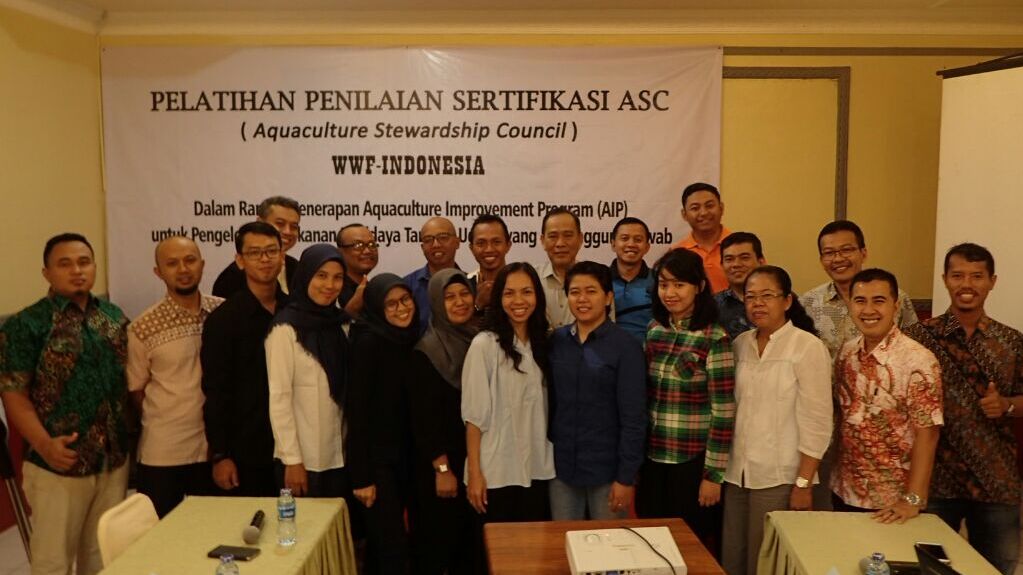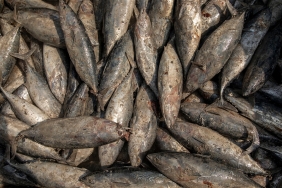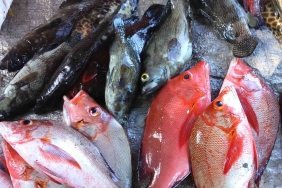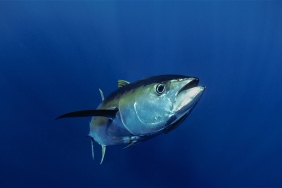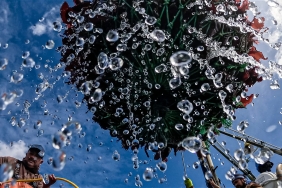STAKEHOLDERS LEARN ABOUT ASC ASSESSMENT THROUGH TRAINING
Since 2009, the Aquaculture Stewardship Council (ASC) standard has been introduced in Indonesia. Supported by WWF, ASC standard training activities have been held at least three times with the agenda of in-class training and field visits to shrimp farming sites.
However, almost ten years after ASC was introduced, some stakeholders do not have an adequate and in-depth understanding of ASC. In fact, having ASC certification can help shrimp farming companies promote environmentally friendly business and farming practices and contribute to the welfare of workers and the surrounding community.
Starting from this principle, WWF tried to further improve the understanding of the community by inviting relevant stakeholders by providing training at Goodrich Suites on June 25-28, 2019. The training was attended by 6 academics as representatives of several universities in Indonesia, 3 representatives of water-related NGOs, 1 representative from the Ministry of Maritime Affairs and Fisheries (KKP), and 4 representatives from shrimp farming companies.
The training was held in Goodrich Suites on June 25-28, 2019.
During the four-day event, participants attended in-class-training sessions on the first and second days, followed by a field visit to PT Ujung Kulon Sukses Makmur Abadi. The program concluded with a presentation of the field findings on the fourth day.
In-class Training on ASC Principles
In the in-class training session, participants were trained on the 7 ASC principles and what to look out for in an ASC assessment when holding a position as an auditor. The seven principles relate to local and national regulations, conservation of animal habitats and biodiversity, protection of workers and social impacts, efficient use of resources, management of diseases and environmental impacts, and responsible construction and operation of units.
Based on the in-class training activities, there are several things that are still questioned by the participants, namely the increase in the selling value of the pond after the ASC standard is obtained, the history of shrimp seedlings, health insurance for workers, the provision of salaries and bonuses, and the sustainability of animal and biological diversification, which sometimes escapes the focus of observation.
"One of the challenging things in the ASC standard is around the use of PSIA (Participatory Social Impact Assessment) because the majority of us come from science clusters, PSIA methods that focus on socio-cultural aspects are quite laborious and require a long time in the process of data verification and technical matters in the field," said Dr. Nurliah from Mataram University. This statement shows that the educational background of the participants is a challenge in the ASC standard assessment process.
Field Trip Vanamei Shrimp Pond Ujung Kulon
In addition to in-class training activities, there are also field visit activities that aim to measure the level of understanding of participants about matters related to ASC. Therefore, on the next day, WWF scheduled a field visit to the farm company PT UKSMA (Ujung Kulon Sukses Makmur Abadi).
In this activity, participants were given the role of ASC standard auditor. Participants were given the opportunity to talk with farm workers to conduct interviews, verify the accuracy of related documents with the reality in the field, and make direct observations regarding activities on the farm.
On the last day, participants presented their findings in the field. Based on the presentation, the WWF team provided evaluation and recommendations related to the methods and ways of data collection that have been done by the participants. In this activity, participants began to understand that the seven principles of ASC is recognized to consider the principles comprehensively in order to create a responsible and sustainable farming (sustainability), although they also admitted to have enough constraints and difficulties when conducting field visits.
The training was closed by giving awards by the WWF team to the best participants during the training. By giving awards, WWF hopes that participants will be able to fulfill their roles as better assessors in auditing aquaculture practices according to ASC standards in the future.

